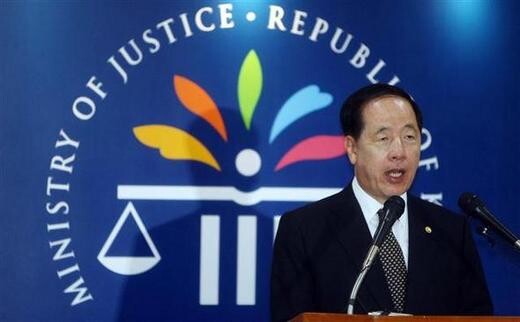hankyoreh
Links to other country sites 다른 나라 사이트 링크
Newspaper execs granted presidential pardons free to move into broadcasting

Critics of President Lee Myung-bak’s decision to pardon convicted executives from the three major conservative newspapers have characterized the move as a symbolic step toward a “new era of cozy ties between the government and media.” It was announced on August 12 that more than 340,000 convicted businesspeople will be pardoned on Liberation Day, August 15.
The critics say that compared with the presidential pardons for convicted businesspeople, made to “save the economy,” the pardons to be granted to the conservative media executives, including the Chosun Ilbo President Bang Sang-hoon and executives from the JoongAng Ilbo and the DongA Ilbo, are unjustified because none of the executives have apologized for their crimes, yet seem to have contempt for the prosecutors and judges that convicted them. The newspaper executives were all convicted of large-scale tax evasion.
Some media scholars also said the pardons to be granted to the conservative media executives could be akin to an “aggressive courtship” by an administration wanting to stay on good terms with the conservative newspapers in the future, as well as a political reward for favorable coverage of the government and the ruling party.
Kim Seo-joong, a professor at SungKongHoe University, described the pardons for the conservative newspaper executives as a “symbolic measure to strengthen the cozy relationship between the government and media.”
Another media scholar said the pardons were made in return for what the government must see as the debts they owe following the candlelight demonstrations, when the three conservative newspapers printed what many saw as coverage favorable to the Lee administration. The convicted media executives could be on the list of special pardons endorsed by President Lee because former journalists with the three newspapers “play an important role in key posts” within the current administration, the scholar said.
Professor Kim pointed out, “Media company owners have a great deal of influence on society and should be subject to stricter social standards. Their sentences should not be lifted.”
Konkuk University Professor Hwang Yong-seok said, “Even the large number of pardons granted to convicted businesspeople is excessive, so there is no justification for pardoning newspaper owners, who must have greater social responsibility and media ethics that are more strict than those followed by corporations.”
Some observers said that the newspaper executives, whose companies are considering expanding into the broadcasting industry, may have been pardoned to allow them to continue in their posts or assume higher posts when the expansions take place. Under the current broadcasting law, people whose sentences are heavier than imprisonment are banned from heading a broadcasting company for five years.
If the government allows newspaper companies to expand into the broadcasting industry, the three conservative newspapers are likely to establish cable TV channels featuring news programs or all-news TV channels. In particular, the Chosun Ilbo chief, who stepped down from his post as the newspaper’s publisher, is expected to return to the post once the pardon takes effect. The newspaper law bans a person from assuming the post of publisher if the person receives a suspended jail sentence.
Kim Young-ho, an executive with the People’s Coalition for Media Reform, said, “Unlike at ordinary companies, the newspaper law restricts the qualifications of publishers because a media company’s job lies within the public interest. The decision to pardon the newspaper executives should be regarded as paving the way for their companies to make inroads into the broadcasting industry.”
Chosun Ilbo chief Bang and the other media executives were all indicted on tax evasion charges in 2001. The Supreme Court found them guilty on charges of tax evasion or embezzlement in 2005 and 2006.
Please direct questions or comments to [englishhani@hani.co.kr]
Editorial・opinion
![[Column] Park Geun-hye déjà vu in Yoon Suk-yeol [Column] Park Geun-hye déjà vu in Yoon Suk-yeol](https://flexible.img.hani.co.kr/flexible/normal/500/300/imgdb/original/2024/0424/651713945113788.jpg) [Column] Park Geun-hye déjà vu in Yoon Suk-yeol
[Column] Park Geun-hye déjà vu in Yoon Suk-yeol![[Editorial] New weight of N. Korea’s nuclear threats makes dialogue all the more urgent [Editorial] New weight of N. Korea’s nuclear threats makes dialogue all the more urgent](https://flexible.img.hani.co.kr/flexible/normal/500/300/imgdb/original/2024/0424/7317139454662664.jpg) [Editorial] New weight of N. Korea’s nuclear threats makes dialogue all the more urgent
[Editorial] New weight of N. Korea’s nuclear threats makes dialogue all the more urgent- [Guest essay] The real reason Korea’s new right wants to dub Rhee a founding father
- [Column] ‘Choson’: Is it time we start referring to N. Korea in its own terms?
- [Editorial] Japan’s rewriting of history with Korea has gone too far
- [Column] The president’s questionable capacity for dialogue
- [Column] Are chaebol firms just pizza pies for families to divvy up as they please?
- [Column] Has Korea, too, crossed the Rubicon on China?
- [Correspondent’s column] In Japan’s alliance with US, echoes of its past alliances with UK
- [Editorial] Does Yoon think the Korean public is wrong?
Most viewed articles
- 1[Column] Park Geun-hye déjà vu in Yoon Suk-yeol
- 2Thursday to mark start of resignations by senior doctors amid standoff with government
- 3Will NewJeans end up collateral damage in internal feud at K-pop juggernaut Hybe?
- 4[Guest essay] The real reason Korea’s new right wants to dub Rhee a founding father
- 5Why Korea shouldn’t welcome Japan’s newly beefed up defense cooperation with US
- 6[Editorial] New weight of N. Korea’s nuclear threats makes dialogue all the more urgent
- 7Kim Jong-un expressed ‘satisfaction’ with nuclear counterstrike drill directed at South
- 8[Column] ‘Choson’: Is it time we start referring to N. Korea in its own terms?
- 9N. Korean hackers breached 10 defense contractors in South for months, police say
- 10‘We must say no’: Seoul defense chief on Korean, USFK involvement in hypothetical Taiwan crisis